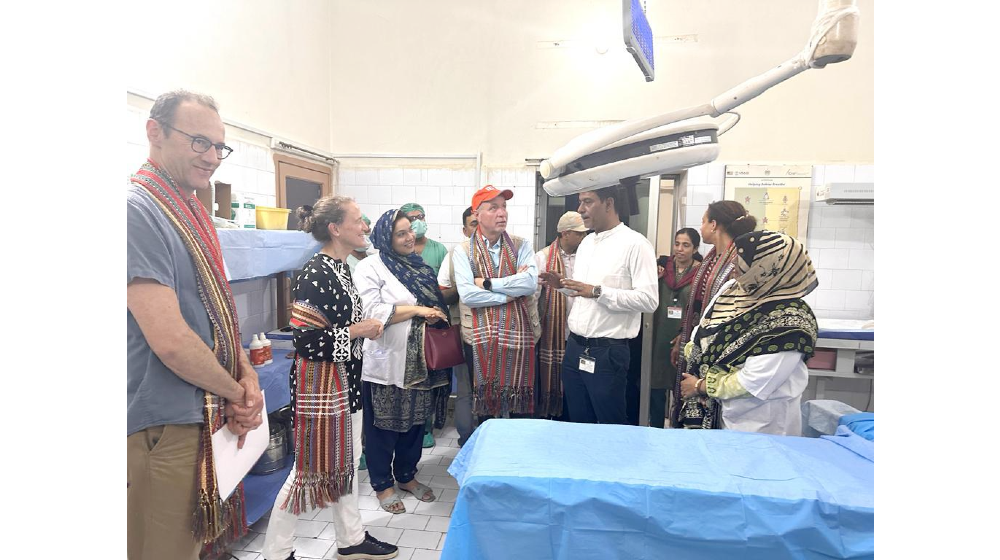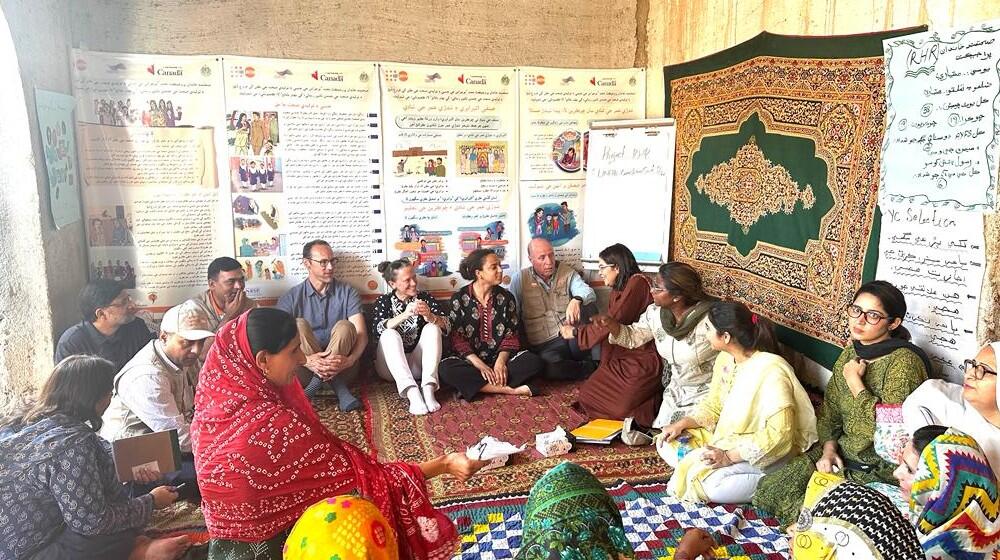The Adolescent Friendly Centre in Village Memon Je Wasi, Union Council Matiari, District Matiari, Sindh, was buzzing as the youth who frequent the centre, together with some parents and community leaders, waited eagerly to meet the delegation from Global Affairs Canada (GAC), the High Commission of Canada to Pakistan and the UNFPA Pakistan team.
The group gathered included youth champions and key community influencers, the Local Support Organization, members of the community who champion prevention and response to gender-based violence (GBV), members of the Community Network on Child Protection & GBV and local paralegals.
The visit was special. Mr. Weldon Epp, Assistant Deputy Minister for Indo-Pacific at GAC, accompanied by the High Commissioner of Canada to the Islamic Republic of Pakistan, Her Excellency Leslie Scanlon and the UNFPA Representative for Pakistan, Dr. Luay Shabaneh, visited the centre.
The interaction at the centre was part of the mission to observe the field-level implementation of the GAC-funded project “Sihat Mand Khaandaan (SMK): Healthy Families for Pakistan through Accelerated Sexual and Reproductive Health and Family Planning Services”. The project is designed to address the remaining challenges in the areas of Sexual and Reproductive Health and Rights, including family planning and maternal health.
“It is so inspiring to meet such high-level people who support our empowerment and help us to promote adolescent-friendly reproductive health services and efforts towards ending gender-based violence,” said a 17-year-old girl Maheen Nadeem Ahmed from Saeedaabad. “This centre has been very instrumental in uplifting the lives of many young people, including me.”
The centre is community-owned and operated by a local support organization with technical support from Rural Support Programmes Network (RSPN) and UNFPA Pakistan. The mission also learnt about crucial efforts done to address child marriage and domestic violence with members and paralegals trained by Legal Aid Society, who also work with funding from the SMK project.
Before the visit to the Adolescent Friendly Centre, the delegation went to Taluka Head Quarters Hospital Hala and interacted with district health officials and trained service providers at the Comprehensive Emergency Obstetric and Newborn Care (CEmONC) service delivery site.
The mission also received a briefing at Aga Khan University Matiari Office about SMK project activities with field teams.

interactions with health service providers at Taluka Head Quarters Hospital Hala
Dr. Waqar Ali Memon, Additional Director, Director General Health Services Sindh, expressed appreciation to GAC and UNFPA Pakistan for supporting the government’s efforts in addressing sexual and reproductive health, including family planning issues in the province.
At the end of the mission, Mr. Weldon Epp said during his visit to Matiari, he was very impressed by the work being done under the leadership of UNFPA and, in partnership with Aga Khan University and several other local organisations, to advance these priorities, both in health facilities and in the communities.”
“The sexual and reproductive health and rights (SRHR) of women and girls is among Canada’s top international assistance priorities. We know that access to SRHR is critical to advancing health, gender equality, human rights, and supporting the empowerment of women and adolescent girls,” said the Assistant Deputy Minister for Indo-Pacific at GAC.
UNFPA Pakistan is working closely with the federal and provincial governments and other implementing partners to ensure a conducive and enabling policy environment, strengthen the delivery of quality, gender-responsive, and inclusive family planning (FP) and reproductive health (RH) services and reduce gender and social barriers to utilization and uptake of FP/RH services by women, men, girls, and boys.
Policy efforts are concentrated at the federal and provincial levels, specifically, Punjab, Sindh, Balochistan, Khyber Pakhtunkhwa, and Gilgit-Baltistan, whereas the service delivery strengthening and social change components are concentrated in selected districts of Sindh (Matiari and Qambar Shahdadkot), Khyber Pakhtunkhwa (Upper and Lower Chitral), and in all districts in Gilgit-Baltistan. The implementation period of the project is from 2020 to 2024.
UNFPA’s Dr. Shabaneh appreciated the support from GAC and the government of Sindh's commitment to the SMK. He applauded the work of the Aga Khan Foundation/ Aga Khan University, AKHS, AKRS, Legal Aid Society, RSPN, Aahung, and other partners who have been critical in implementing the project. He pledged UNFPA's continued productive collaboration with partners beyond the current phase of the SMK to accelerate the achievements toward the Sustainable Development Goals.
In his remarks, Dr. Shabaneh emphasised the need to uphold women’s reproductive rights as indicated in UNFPA’s global flagship report, the State of World Population, launched on 19 April 2023.
“Nobody should hold women accountable for population decline or increase. Making the best services, advocacy and information in which women and couples can make informed decisions is the most appropriate approach to address population anxiety,” said Dr. Shabaneh.
---Pilirani Semu-Banda


